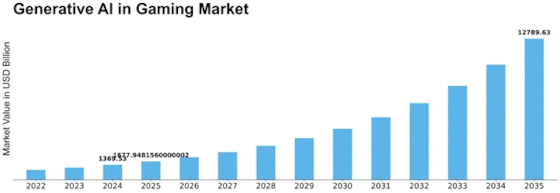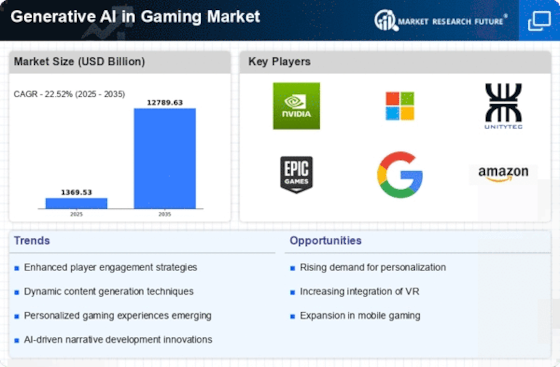Game Development
Content Generation
Character Design
Level Design
Testing and Quality Assurance
PC
Console
Mobile
Cloud Gaming
On-Premises
Cloud-Based
Game Developers
Gaming Studios
Independent Developers
North America
Europe
South America
Asia Pacific
Middle East and Africa
North America Outlook (USD Billion, 2019-2035)
North America Generative AI in Gaming Market by Application Type
Game Development
Content Generation
Character Design
Level Design
Testing and Quality Assurance
North America Generative AI in Gaming Market by Platform Type
PC
Console
Mobile
Cloud Gaming
North America Generative AI in Gaming Market by Deployment Type
On-Premises
Cloud-Based
North America Generative AI in Gaming Market by End User Type
Game Developers
Gaming Studios
Independent Developers
North America Generative AI in Gaming Market by Regional Type
US
Canada
US Outlook (USD Billion, 2019-2035)
US Generative AI in Gaming Market by Application Type
Game Development
Content Generation
Character Design
Level Design
Testing and Quality Assurance
US Generative AI in Gaming Market by Platform Type
PC
Console
Mobile
Cloud Gaming
US Generative AI in Gaming Market by Deployment Type
On-Premises
Cloud-Based
US Generative AI in Gaming Market by End User Type
Game Developers
Gaming Studios
Independent Developers
CANADA Outlook (USD Billion, 2019-2035)
CANADA Generative AI in Gaming Market by Application Type
Game Development
Content Generation
Character Design
Level Design
Testing and Quality Assurance
CANADA Generative AI in Gaming Market by Platform Type
PC
Console
Mobile
Cloud Gaming
CANADA Generative AI in Gaming Market by Deployment Type
On-Premises
Cloud-Based
CANADA Generative AI in Gaming Market by End User Type
Game Developers
Gaming Studios
Independent Developers
Europe Outlook (USD Billion, 2019-2035)
Europe Generative AI in Gaming Market by Application Type
Game Development
Content Generation
Character Design
Level Design
Testing and Quality Assurance
Europe Generative AI in Gaming Market by Platform Type
PC
Console
Mobile
Cloud Gaming
Europe Generative AI in Gaming Market by Deployment Type
On-Premises
Cloud-Based
Europe Generative AI in Gaming Market by End User Type
Game Developers
Gaming Studios
Independent Developers
Europe Generative AI in Gaming Market by Regional Type
Germany
UK
France
Russia
Italy
Spain
Rest of Europe
GERMANY Outlook (USD Billion, 2019-2035)
GERMANY Generative AI in Gaming Market by Application Type
Game Development
Content Generation
Character Design
Level Design
Testing and Quality Assurance
GERMANY Generative AI in Gaming Market by Platform Type
PC
Console
Mobile
Cloud Gaming
GERMANY Generative AI in Gaming Market by Deployment Type
On-Premises
Cloud-Based
GERMANY Generative AI in Gaming Market by End User Type
Game Developers
Gaming Studios
Independent Developers
UK Outlook (USD Billion, 2019-2035)
UK Generative AI in Gaming Market by Application Type
Game Development
Content Generation
Character Design
Level Design
Testing and Quality Assurance
UK Generative AI in Gaming Market by Platform Type
PC
Console
Mobile
Cloud Gaming
UK Generative AI in Gaming Market by Deployment Type
On-Premises
Cloud-Based
UK Generative AI in Gaming Market by End User Type
Game Developers
Gaming Studios
Independent Developers
FRANCE Outlook (USD Billion, 2019-2035)
FRANCE Generative AI in Gaming Market by Application Type
Game Development
Content Generation
Character Design
Level Design
Testing and Quality Assurance
FRANCE Generative AI in Gaming Market by Platform Type
PC
Console
Mobile
Cloud Gaming
FRANCE Generative AI in Gaming Market by Deployment Type
On-Premises
Cloud-Based
FRANCE Generative AI in Gaming Market by End User Type
Game Developers
Gaming Studios
Independent Developers
RUSSIA Outlook (USD Billion, 2019-2035)
RUSSIA Generative AI in Gaming Market by Application Type
Game Development
Content Generation
Character Design
Level Design
Testing and Quality Assurance
RUSSIA Generative AI in Gaming Market by Platform Type
PC
Console
Mobile
Cloud Gaming
RUSSIA Generative AI in Gaming Market by Deployment Type
On-Premises
Cloud-Based
RUSSIA Generative AI in Gaming Market by End User Type
Game Developers
Gaming Studios
Independent Developers
ITALY Outlook (USD Billion, 2019-2035)
ITALY Generative AI in Gaming Market by Application Type
Game Development
Content Generation
Character Design
Level Design
Testing and Quality Assurance
ITALY Generative AI in Gaming Market by Platform Type
PC
Console
Mobile
Cloud Gaming
ITALY Generative AI in Gaming Market by Deployment Type
On-Premises
Cloud-Based
ITALY Generative AI in Gaming Market by End User Type
Game Developers
Gaming Studios
Independent Developers
SPAIN Outlook (USD Billion, 2019-2035)
SPAIN Generative AI in Gaming Market by Application Type
Game Development
Content Generation
Character Design
Level Design
Testing and Quality Assurance
SPAIN Generative AI in Gaming Market by Platform Type
PC
Console
Mobile
Cloud Gaming
SPAIN Generative AI in Gaming Market by Deployment Type
On-Premises
Cloud-Based
SPAIN Generative AI in Gaming Market by End User Type
Game Developers
Gaming Studios
Independent Developers
REST OF EUROPE Outlook (USD Billion, 2019-2035)
REST OF EUROPE Generative AI in Gaming Market by Application Type
Game Development
Content Generation
Character Design
Level Design
Testing and Quality Assurance
REST OF EUROPE Generative AI in Gaming Market by Platform Type
PC
Console
Mobile
Cloud Gaming
REST OF EUROPE Generative AI in Gaming Market by Deployment Type
On-Premises
Cloud-Based
REST OF EUROPE Generative AI in Gaming Market by End User Type
Game Developers
Gaming Studios
Independent Developers
APAC Outlook (USD Billion, 2019-2035)
APAC Generative AI in Gaming Market by Application Type
Game Development
Content Generation
Character Design
Level Design
Testing and Quality Assurance
APAC Generative AI in Gaming Market by Platform Type
PC
Console
Mobile
Cloud Gaming
APAC Generative AI in Gaming Market by Deployment Type
On-Premises
Cloud-Based
APAC Generative AI in Gaming Market by End User Type
Game Developers
Gaming Studios
Independent Developers
APAC Generative AI in Gaming Market by Regional Type
China
India
Japan
South Korea
Malaysia
Thailand
Indonesia
Rest of APAC
CHINA Outlook (USD Billion, 2019-2035)
CHINA Generative AI in Gaming Market by Application Type
Game Development
Content Generation
Character Design
Level Design
Testing and Quality Assurance
CHINA Generative AI in Gaming Market by Platform Type
PC
Console
Mobile
Cloud Gaming
CHINA Generative AI in Gaming Market by Deployment Type
On-Premises
Cloud-Based
CHINA Generative AI in Gaming Market by End User Type
Game Developers
Gaming Studios
Independent Developers
INDIA Outlook (USD Billion, 2019-2035)
INDIA Generative AI in Gaming Market by Application Type
Game Development
Content Generation
Character Design
Level Design
Testing and Quality Assurance
INDIA Generative AI in Gaming Market by Platform Type
PC
Console
Mobile
Cloud Gaming
INDIA Generative AI in Gaming Market by Deployment Type
On-Premises
Cloud-Based
INDIA Generative AI in Gaming Market by End User Type
Game Developers
Gaming Studios
Independent Developers
JAPAN Outlook (USD Billion, 2019-2035)
JAPAN Generative AI in Gaming Market by Application Type
Game Development
Content Generation
Character Design
Level Design
Testing and Quality Assurance
JAPAN Generative AI in Gaming Market by Platform Type
PC
Console
Mobile
Cloud Gaming
JAPAN Generative AI in Gaming Market by Deployment Type
On-Premises
Cloud-Based
JAPAN Generative AI in Gaming Market by End User Type
Game Developers
Gaming Studios
Independent Developers
SOUTH KOREA Outlook (USD Billion, 2019-2035)
SOUTH KOREA Generative AI in Gaming Market by Application Type
Game Development
Content Generation
Character Design
Level Design
Testing and Quality Assurance
SOUTH KOREA Generative AI in Gaming Market by Platform Type
PC
Console
Mobile
Cloud Gaming
SOUTH KOREA Generative AI in Gaming Market by Deployment Type
On-Premises
Cloud-Based
SOUTH KOREA Generative AI in Gaming Market by End User Type
Game Developers
Gaming Studios
Independent Developers
MALAYSIA Outlook (USD Billion, 2019-2035)
MALAYSIA Generative AI in Gaming Market by Application Type
Game Development
Content Generation
Character Design
Level Design
Testing and Quality Assurance
MALAYSIA Generative AI in Gaming Market by Platform Type
PC
Console
Mobile
Cloud Gaming
MALAYSIA Generative AI in Gaming Market by Deployment Type
On-Premises
Cloud-Based
MALAYSIA Generative AI in Gaming Market by End User Type
Game Developers
Gaming Studios
Independent Developers
THAILAND Outlook (USD Billion, 2019-2035)
THAILAND Generative AI in Gaming Market by Application Type
Game Development
Content Generation
Character Design
Level Design
Testing and Quality Assurance
THAILAND Generative AI in Gaming Market by Platform Type
PC
Console
Mobile
Cloud Gaming
THAILAND Generative AI in Gaming Market by Deployment Type
On-Premises
Cloud-Based
THAILAND Generative AI in Gaming Market by End User Type
Game Developers
Gaming Studios
Independent Developers
INDONESIA Outlook (USD Billion, 2019-2035)
INDONESIA Generative AI in Gaming Market by Application Type
Game Development
Content Generation
Character Design
Level Design
Testing and Quality Assurance
INDONESIA Generative AI in Gaming Market by Platform Type
PC
Console
Mobile
Cloud Gaming
INDONESIA Generative AI in Gaming Market by Deployment Type
On-Premises
Cloud-Based
INDONESIA Generative AI in Gaming Market by End User Type
Game Developers
Gaming Studios
Independent Developers
REST OF APAC Outlook (USD Billion, 2019-2035)
REST OF APAC Generative AI in Gaming Market by Application Type
Game Development
Content Generation
Character Design
Level Design
Testing and Quality Assurance
REST OF APAC Generative AI in Gaming Market by Platform Type
PC
Console
Mobile
Cloud Gaming
REST OF APAC Generative AI in Gaming Market by Deployment Type
On-Premises
Cloud-Based
REST OF APAC Generative AI in Gaming Market by End User Type
Game Developers
Gaming Studios
Independent Developers
South America Outlook (USD Billion, 2019-2035)
South America Generative AI in Gaming Market by Application Type
Game Development
Content Generation
Character Design
Level Design
Testing and Quality Assurance
South America Generative AI in Gaming Market by Platform Type
PC
Console
Mobile
Cloud Gaming
South America Generative AI in Gaming Market by Deployment Type
On-Premises
Cloud-Based
South America Generative AI in Gaming Market by End User Type
Game Developers
Gaming Studios
Independent Developers
South America Generative AI in Gaming Market by Regional Type
Brazil
Mexico
Argentina
Rest of South America
BRAZIL Outlook (USD Billion, 2019-2035)
BRAZIL Generative AI in Gaming Market by Application Type
Game Development
Content Generation
Character Design
Level Design
Testing and Quality Assurance
BRAZIL Generative AI in Gaming Market by Platform Type
PC
Console
Mobile
Cloud Gaming
BRAZIL Generative AI in Gaming Market by Deployment Type
On-Premises
Cloud-Based
BRAZIL Generative AI in Gaming Market by End User Type
Game Developers
Gaming Studios
Independent Developers
MEXICO Outlook (USD Billion, 2019-2035)
MEXICO Generative AI in Gaming Market by Application Type
Game Development
Content Generation
Character Design
Level Design
Testing and Quality Assurance
MEXICO Generative AI in Gaming Market by Platform Type
PC
Console
Mobile
Cloud Gaming
MEXICO Generative AI in Gaming Market by Deployment Type
On-Premises
Cloud-Based
MEXICO Generative AI in Gaming Market by End User Type
Game Developers
Gaming Studios
Independent Developers
ARGENTINA Outlook (USD Billion, 2019-2035)
ARGENTINA Generative AI in Gaming Market by Application Type
Game Development
Content Generation
Character Design
Level Design
Testing and Quality Assurance
ARGENTINA Generative AI in Gaming Market by Platform Type
PC
Console
Mobile
Cloud Gaming
ARGENTINA Generative AI in Gaming Market by Deployment Type
On-Premises
Cloud-Based
ARGENTINA Generative AI in Gaming Market by End User Type
Game Developers
Gaming Studios
Independent Developers
REST OF SOUTH AMERICA Outlook (USD Billion, 2019-2035)
REST OF SOUTH AMERICA Generative AI in Gaming Market by Application Type
Game Development
Content Generation
Character Design
Level Design
Testing and Quality Assurance
REST OF SOUTH AMERICA Generative AI in Gaming Market by Platform Type
PC
Console
Mobile
Cloud Gaming
REST OF SOUTH AMERICA Generative AI in Gaming Market by Deployment Type
On-Premises
Cloud-Based
REST OF SOUTH AMERICA Generative AI in Gaming Market by End User Type
Game Developers
Gaming Studios
Independent Developers
MEA Outlook (USD Billion, 2019-2035)
MEA Generative AI in Gaming Market by Application Type
Game Development
Content Generation
Character Design
Level Design
Testing and Quality Assurance
MEA Generative AI in Gaming Market by Platform Type
PC
Console
Mobile
Cloud Gaming
MEA Generative AI in Gaming Market by Deployment Type
On-Premises
Cloud-Based
MEA Generative AI in Gaming Market by End User Type
Game Developers
Gaming Studios
Independent Developers
MEA Generative AI in Gaming Market by Regional Type
GCC Countries
South Africa
Rest of MEA
GCC COUNTRIES Outlook (USD Billion, 2019-2035)
GCC COUNTRIES Generative AI in Gaming Market by Application Type
Game Development
Content Generation
Character Design
Level Design
Testing and Quality Assurance
GCC COUNTRIES Generative AI in Gaming Market by Platform Type
PC
Console
Mobile
Cloud Gaming
GCC COUNTRIES Generative AI in Gaming Market by Deployment Type
On-Premises
Cloud-Based
GCC COUNTRIES Generative AI in Gaming Market by End User Type
Game Developers
Gaming Studios
Independent Developers
SOUTH AFRICA Outlook (USD Billion, 2019-2035)
SOUTH AFRICA Generative AI in Gaming Market by Application Type
Game Development
Content Generation
Character Design
Level Design
Testing and Quality Assurance
SOUTH AFRICA Generative AI in Gaming Market by Platform Type
PC
Console
Mobile
Cloud Gaming
SOUTH AFRICA Generative AI in Gaming Market by Deployment Type
On-Premises
Cloud-Based
SOUTH AFRICA Generative AI in Gaming Market by End User Type
Game Developers
Gaming Studios
Independent Developers
REST OF MEA Outlook (USD Billion, 2019-2035)
REST OF MEA Generative AI in Gaming Market by Application Type
Game Development
Content Generation
Character Design
Level Design
Testing and Quality Assurance
REST OF MEA Generative AI in Gaming Market by Platform Type
PC
Console
Mobile
Cloud Gaming
REST OF MEA Generative AI in Gaming Market by Deployment Type
On-Premises
Cloud-Based
REST OF MEA Generative AI in Gaming Market by End User Type
Game Developers
Gaming Studios
Independent Developers



















Leave a Comment